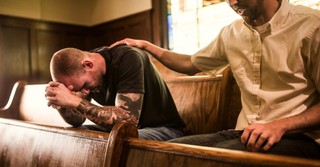- Recent Translations
- All Translations
Isaiah 55:7
Share
Settings
Isaiah 55:7 Meaning and Commentary
Let the wicked forsake his way
His evil way, as the Targum paraphrases it, his wicked course of life; and which is his own way, of his own choosing, and in which he delights, and a very dangerous one it is; and yet he is bent upon it, and nothing can turn him from it but efficacious grace; nor will he ever forsake it till he sees the evil, danger, and loathsomeness of it; and when he does forsake it, it is so as not to make sin the course of his life, though he does not and cannot live without sin. The word for "wicked" signifies restless, troublesome, and ungodly, and is expressive of the pollution and guilt of sin all are under. Some are notoriously wicked, and all men are wicked in the account of God, though they may think otherwise themselves; and they become so their own apprehensions, when they are thoroughly awakened and convinced of sin, and of the evil of their ways, and are enabled to forsake them: though this may also be understood of "his own way" of saving himself, which is by works of righteousness he has done, in opposition to God's way of saving men by Jesus Christ; which way of his own must be relinquished, and Christ alone must be applied unto, and laid hold on, for salvation: and the unrighteous man his thoughts:
not his natural thoughts, but his sinful ones, his wrong thoughts of religion, righteousness, and salvation; particularly his thoughts of being justified by his own righteousness; which thoughts are to be forsaken, as being contrary to God's way of justifying sinners; and as all men are unrighteous, are destitute of righteousness, and full of unrighteousness, so is the self-righteous person; and he must be divested of all thoughts of his own righteousness, and acknowledge himself an unrighteous man, ere he receives mercy, forgiveness, righteousness and salvation, at the hands of the Lord: and let him return unto the Lord;
from whom he has departed, against whom he has sinned, and who only can save him; and this he does when he comes and acknowledges his sin before the Lord, implores his grace and mercy, and attends his word and worship; all which is the fruit and effect of powerful and efficacious grace, in turning and drawing. The Targum is,
``and let him turn to the worship of the Lord:''and he will have mercy upon him;
which shows that the returning of the sinner to God is not meritorious, it is mercy still to receive him; and which is here mentioned as the motive to return; there is an abundance of it with the Lord, and he has resolved and promised to show it, and he takes delight in it, and many are the instances of it: and to our God, for he will abundantly pardon;
God is to be applied unto, not as an absolute God, or out of Christ; but as our God in Christ, in whom he has proclaimed his name, a God gracious and merciful, and so he does abundantly pardon. The promise of pardon is absolute and unconditional, and is here observed as the motive to forsake sin, and not that as the condition of pardon; the design is to comfort those that are distressed with sin; God does and will pardon, and none but he can, and he has declared that he will; forgiveness is with him, and it is published in the Gospel, and there have been many instances of it. The Lord does abundantly pardon,
or "multiply to pardon" F13; he pardons all sorts of sinners, and all sorts of sins; original sin, actual sins and transgressions; all backslidings and revoltings; all but the sin against the Holy Ghost.
F13 (xwlol hbry) "multiplicabit ad parcendum vel ut parcat", Pagninus, Montanus, Vatablus; "multiplicabit condonare", Cocceius; "multus erit ut proritietur": Munster.

